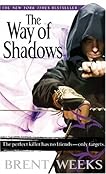 The Way of Shadows by Brent Weeks
The Way of Shadows by Brent WeeksMy rating: 2 of 5 stars
This book was a reasonably entertaining read, but it assaults the reader's willing suspension of disbelief too often to be more than that. The setting is a small kingdom with a powerful criminal underworld. The technology is roughly analogous to Europe's high middle ages. There is a religion that appears to represent Christianity, which coexists with polytheism. There is a character who represents nihilism, two who represent chivalry, one who represents military honor, one who represents true love, and one who has been redeemed by the Christianity analog. The novel has magicians and a dark lord equivalent. In other words, it's made up of standard fantasy tropes.
Now, the criminal underworld is so powerful that it de facto has run the kingdom for at least decades. It has access to magically enhanced super assassins who are next to impossible to stop. Thus, the local mob kills the leaders who would get in its way and allows those who cooperate to assume power. This brings up one of the disbelief killers: How could the chivalry avatars survive in such an environment? They aren't mere knights; they are a duke and his son. Surely such powerful men would have long since either been co-opted by the underworld or destroyed. The author never explains how they survived. The reader is forced to conclude that they did so because the author wanted some chivalrous characters.
Another attack on the reader's disbelief is the redeemed-by-God character and his relationship to slavery. The reader learns that as a young man he was an up-and-comer with the local mob. He develops the idea of importing slavery into the kingdom. It turns out to be wildly profitable. He becomes a mob leader. Then his wife brings him to God and he somehow manages to end slavery again within a couple decades of its introduction, as one can estimated by the ages of his children. He becomes a relatively poor--he's still a count and a lawyer--but virtuous man. It is never explained how he manages to accomplish this improbable feat. Why didn't the mob kill him when he began to oppose such a profitable business?
Furthermore, the virtuous count knowingly agrees to house, educate, and introduce to society the apprentice of one of the super-assassins. It is explained that he became a friend of the assassin while still a mobster; nevertheless, this strikes the reader as strange behavior for a supposedly virtuous man.
Finally, an important element of the narrative is that members of the underworld must give up all ties of love. They must never establish families, because loved ones who can be attacked allow too much power over the mobsters. This allows a vigorous circulation of the elites within the mob and lets the author establish a theme that love can redeem even the greatest of sinners. Unfortunately, that's not how the mafia in our real world works. At least at its height, it had the rule that wives and children were left alone. The mafiosi had and continue to have families. Why wasn't such an agreement instituted among Mr. Weeks fantasyland gangsters? Human nature is to establish families and attempt to pass one's wealth and advantages on to one's children (with varying levels of hypocrisy about one's intentions). Thus, a criminal underworld that has never established rules to protect non-combatants is the less natural state and is something that needs to be explained by the author.
In short, I never bought into the author's characters and setting. That the book still manages to be readable is testament to the author's ability to play upon the reader's emotions.
View all my reviews
1 comment:
Mate, why are you wasting your time writing reviews when you possess such terrific story-telling talent? If you're blocked with Magicians' Integration, start something new and have some fun!
William
Post a Comment